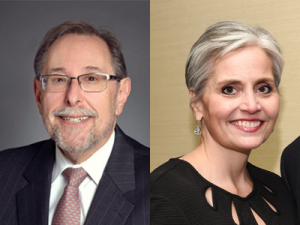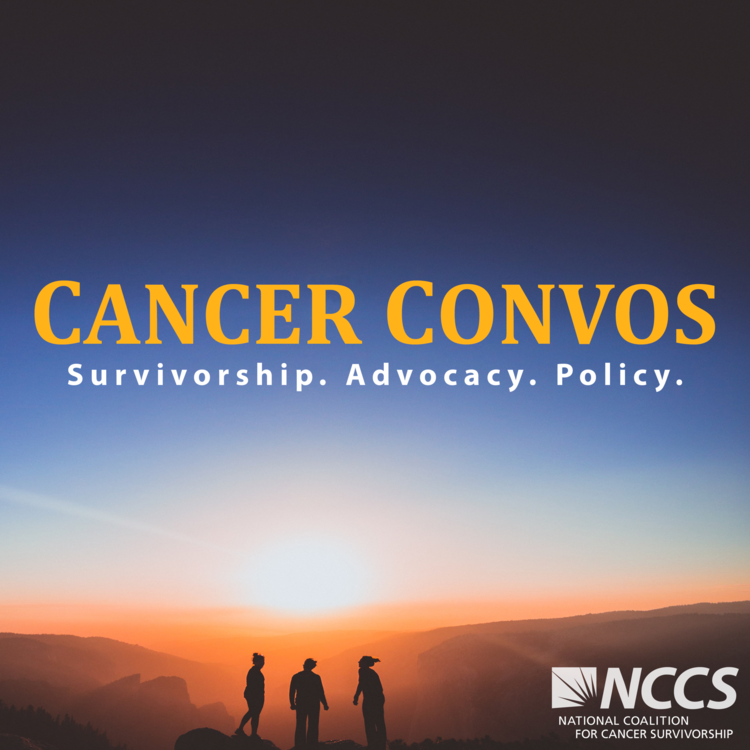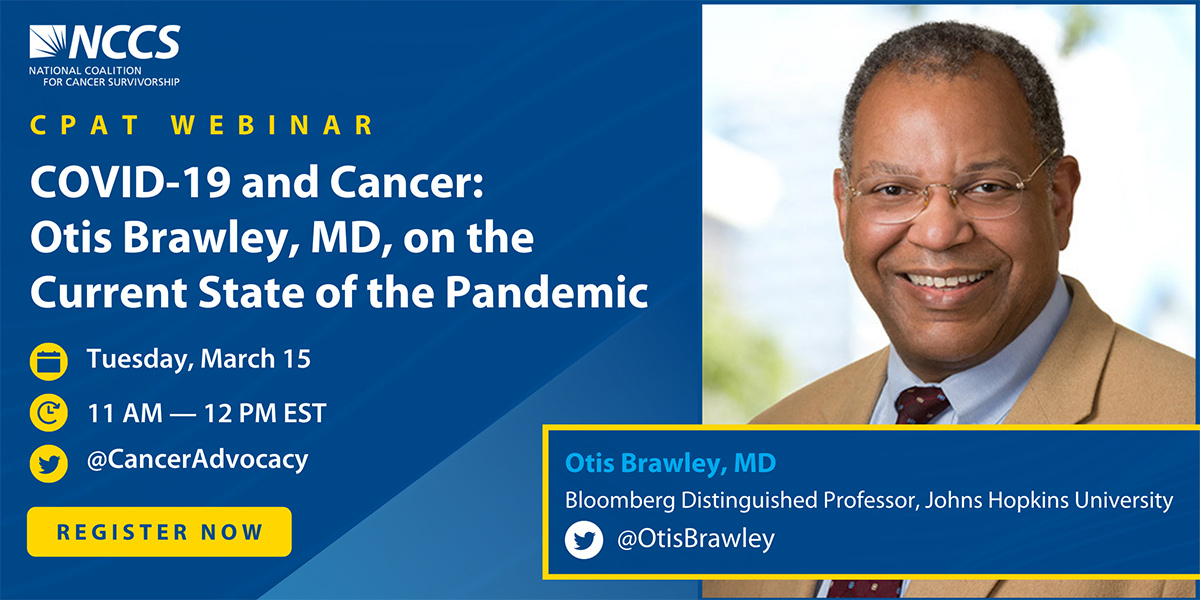NCCS is now Cancer Nation. Find out more about our next chapter. Join Us
COVID-19 Resources for Cancer Survivors
NCCS heard from many survivors who feel uniquely vulnerable due to their history of cancer treatments. And we have heard from people currently in treatment, who are worried about delays in care and navigating a stressed health care system.
We’re partnering and consulting with several cancer organizations and experts to address the questions and concerns survivors have shared.
COVID-19 and Cancer: Otis Brawley, MD on the Current State of the Pandemic
Tuesday, March 15, 2022
Otis Brawley, MD, a globally-recognized expert in cancer prevention and control, joins NCCS CEO Shelley Fuld Nasso to discuss the current state of the COVID-19 pandemic and what relaxed public health measures mean for immunocompromised individuals. He will answer questions from CPAT members about how cancer survivors can best protect themselves.
COVID-19 Vaccines: What Cancer Survivors Need to Know
A Conversation with Otis Brawley, MD (February 2021)
Internationally-recognized cancer control expert and epidemiologist Otis Brawley, MD talks with NCCS CEO Shelley Fuld Nasso to answer questions from survivors and advocates about COVID-19 vaccines and the cancer community. Topics they discuss include comparisons of the different vaccines, the safety of the vaccines in general, safety for survivors of certain cancers, common side effects, how the vaccines were developed, and more.
Watch the Full Conversation
What is it that makes cancer patients at higher risk? Is it the cancer itself or is it treatments for cancer? And if it’s the treatments, which treatments make patients more vulnerable?
The people who are at risk for contracting the disease are people who have a lowered immune system. Now that lowered immune system can sometimes come about because of cancer treatment. Say people who have solid tumors, colorectal cancer, or breast cancer, their immune system is relatively intact. When we start giving them chemotherapy, their immune system is damaged. One of the side effects of treating the cancer. People have lymphoma and leukemia on the other hand, that’s a cancer of the immune system. Their immune system has a problem to begin with. So the approach to coronavirus should be different between the two. We have a lot of data to show that people who have leukemia, especially who get coronavirus are more likely to have bad outcomes. Most people do well, but they’re more likely to have bad outcomes compared to the people who have solid tumor disease. People who have solid tumor disease who are cured are at essentially the same risk as people who are of the same age and basic health. And the people who have treatment. Now, people who are getting treated with drugs that specifically target B cells that make immunoglobulin are at especially higher risk for Coronavirus. B cell treatments are common in leukemia and lymphoma.
What do you say to people who are hesitant to take the vaccine and concerned that they were approved so quickly?
Yeah, well, the education, I think is the most important part and folks who are hesitant to get the vaccine while I respect their hesitancy, I’ll tell them, everyone that I talked to who’s gotten the vaccine is of the belief that getting COVID is far worse. They haven’t talked to people who’ve gotten COVID. Getting COVID is far worse than getting the vaccine. Now that being said, there’s a lot of people say, how is it that this vaccine was the virus was discovered last December of 2019, we had a vaccine candidate by May of 2020, and now we’re giving it, you said 19 million people have gotten both vaccinations complete? Well, let me explain. It didn’t take six months to develop that vaccine. It took 50 years. Those of us who work in the world of cancer and oncology should be able to understand much of the science that went into developing the vaccine and understanding this disease were things that were developed in the war on cancer.
And it’s very much related to Richard Nixon signing the National Cancer Act in 1971. You know, the fact that we had a problem and, a problem in China, within 45 days and realizing that problem in China, they published for the world on the internet, the RNA sequence. The fact that we use these messenger RNA viruses, those were developed 20 years ago in cancer work. Some of the drugs, the recombinant DNA, the Remdesivir, I’m sorry, recombinant antibodies, the remdesivir to block replication. These were all things that were all developed out of cancer work. And so one could really say it took a long time to develop the vaccine. A lot of the work was done well before we actually knew there was a virus out there. And I’ve looked at the studies, the studies have been done very, very well. There’s an argument that the Moderna and Pfizer vaccines have been researched better than most that are FDA approved.
More Vaccine Resources
- “COVID-19 Vaccine & Patients with Cancer” »
American Society of Clinical Oncology (ASCO) - “The Next Phase of Vaccine Distribution: High-Risk Medical Conditions” »
Kaiser Family Foundation - “Coronavirus Vaccines and People with Cancer: A Q&A with Dr. Steven Pergam” »
National Cancer Institute
Frequently Asked Clinical Questions
NCCS and the American Society of Clinical Oncology (ASCO) worked together to provide information about how COVID-19 could potentially affect the health and cancer care of people diagnosed with cancer.
Click the link below to find answers to cancer survivors’ frequently asked clinical questions about COVID-19 from ASCO Chief Medical Officer and Executive Vice President Dr. Richard Schilsky.

Richard Schilsky, MD, FACP, FSCT, FASCO, and NCCS CEO Shelley Fuld Nasso

NCCS Podcast Hosts Health Care Experts Who Address Coronavirus’ Impact on Cancer Survivors
Listen to NCCS’ podcast, Cancer Convos, for more insights on COVID-19 and its impact on cancer patients and survivors. Subscribe to Cancer Convos on Apple Podcasts or your favorite podcast app.
How Survivors Can Cope With the Anxiety of COVID-19
Answered by L. Imani Price, PhD.
Dr. L. Imani Price is a licensed psychologist at Women’s InnerFitness and Wellness Center and serves as the Vice Chair of the Board of Directors at Breast Care for Washington, D.C.
Dr. Price suggests this expert advice:
Many survivors are experiencing stress, anxiety, and PTSD from the new expectations and restrictions resulting from the COVID-19 pandemic. These uncertain times can lead to feelings of helplessness and a lack of control over one’s life. This may trigger thoughts of stressful events of the past with worries about one’s health or that of loved ones.
Although experiencing some levels of anxiety and fear can be expected, we do have some control over our lives, despite the global restrictions from the pandemic.
While learning to live indoors:
- Develop a routine or schedule for your time, which includes the time you will wake up, time for movement/exercise, regular check-ins with friends, and regular family activities. Having a schedule can help center your emotions and give you a sense of control over your life.
- Take a breath. Deep breathing helps reduce stress in the body, reduces muscle tension, and calms the mind. It also increases the flow of oxygen to the brain, which helps with clarity, memory, and wellbeing. You can use DVDs or apps for exercising, find free breathing or meditation apps (Insight Timer or Calm) for techniques, or walk around your home or yard and climb stairs for movement.
- Stay in touch with the people you love with virtual communication and telephone calls. Use your time to start a daily conference or virtual call through a free conference or virtual call company with friends for a book club; Bible Study; prayer; or start a recipe exchange club where members alternate bringing new recipes to the group, cook it at the same time, and share the outcomes.
- Start a new hobby or learn a new skill. Embrace your creativity to help with mental acuity, expression, and entertainment. Let your creative self shine with these few suggestions and anything else your thoughts will lead you to do.
Watch our webinar on stress and anxiety featuring Dr. Price:
Helpline for Cancer Support
The Cancer Support Community (CSC) Cancer Support Helpline is staffed by counselors and resource specialists who have extensive years of experience helping people affected by cancer. Counselors and resource specialists can be reached by phone at 1-888-793-9355 or live chat from Monday through Friday, 9:00 a.m. – 9:00 p.m. ET, and Saturday and Sunday from 9:00 a.m. – 5:00 p.m. ET.
Resources About Loss of Health Coverage
This blog on COVID-19 by Karen Pollitz at Kaiser Family Foundation outlines what you can do about losing health coverage during this crisis.
For information about transitioning from job based coverage to other forms of coverage (including Medicaid and COBRA), see these resources:
- Health coverage options if you’re unemployed
- Losing Job-based Coverage
- Medicaid & CHIP coverage
- COBRA coverage and the Marketplace
- COBRA Continuation Coverage Questions and Answers
- Complex Case Scenarios – Preventing Gaps in Health Care Coverage Mini-Series: Transitioning from Employer-Sponsored Coverage to Other Health Coverage – June 5, 2015 (slides)
For information on Special Enrollment Periods, see here:
For updated guidance on grace periods for binder and premium payments see here:
Additional Resources
- “Coronavirus: What Cancer Patients Need to Know”
Fred Hutchinson Cancer Research Center - “Coronavirus: What People with Cancer Should Know”
National Cancer Institute - “Coronavirus 2019: What People With Cancer Need to Know”
American Society of Clinical Oncology’s (ASCO) Cancer.Net - ASCO – Coronavirus Resources
ASCO.org - “Coronavirus Disease 2019 (COVID-19) in the U.S.”
Centers for Disease Control and Prevention (CDC)
Questions About Coronavirus?
NCCS is seeking answers from public health experts on the coronavirus and its impact on cancer patients and survivors. Please contact us at www.canceradvocacy.org/contact with any questions or concerns you have and what data would be helpful to you as we gather this information.
NCCS COVID-19 resources are sponsored in part by The Pfizer Foundation.



